A Comprehensive Analysis of Employment Status and UK Labor Laws
VerifiedAdded on 2023/06/05
|11
|4601
|348
Essay
AI Summary
This essay provides a comprehensive analysis of employment status under the UK's legal framework, focusing on the distinctions between employees, workers, and the self-employed. It examines key legislation such as the Employment Rights Act 1996 and the National Minimum Wage Act 1998, highlighting how these laws protect workers from exploitation. The essay also delves into significant case law, including Autoclenz Ltd. V Belcher, to illustrate the practical application of these laws. Furthermore, it addresses the challenges posed by the rise of the gig economy and its impact on traditional employment relationships, using the example of Uber drivers to explore the complexities of determining worker status and ensuring fair labor practices. The purposive approach to legal interpretation is discussed, emphasizing the importance of understanding the intent behind employment regulations to safeguard worker rights and maintain equitable labor standards. The essay concludes by underscoring the need for ongoing adaptation of employment laws to address evolving economic landscapes and prevent the erosion of worker protections.
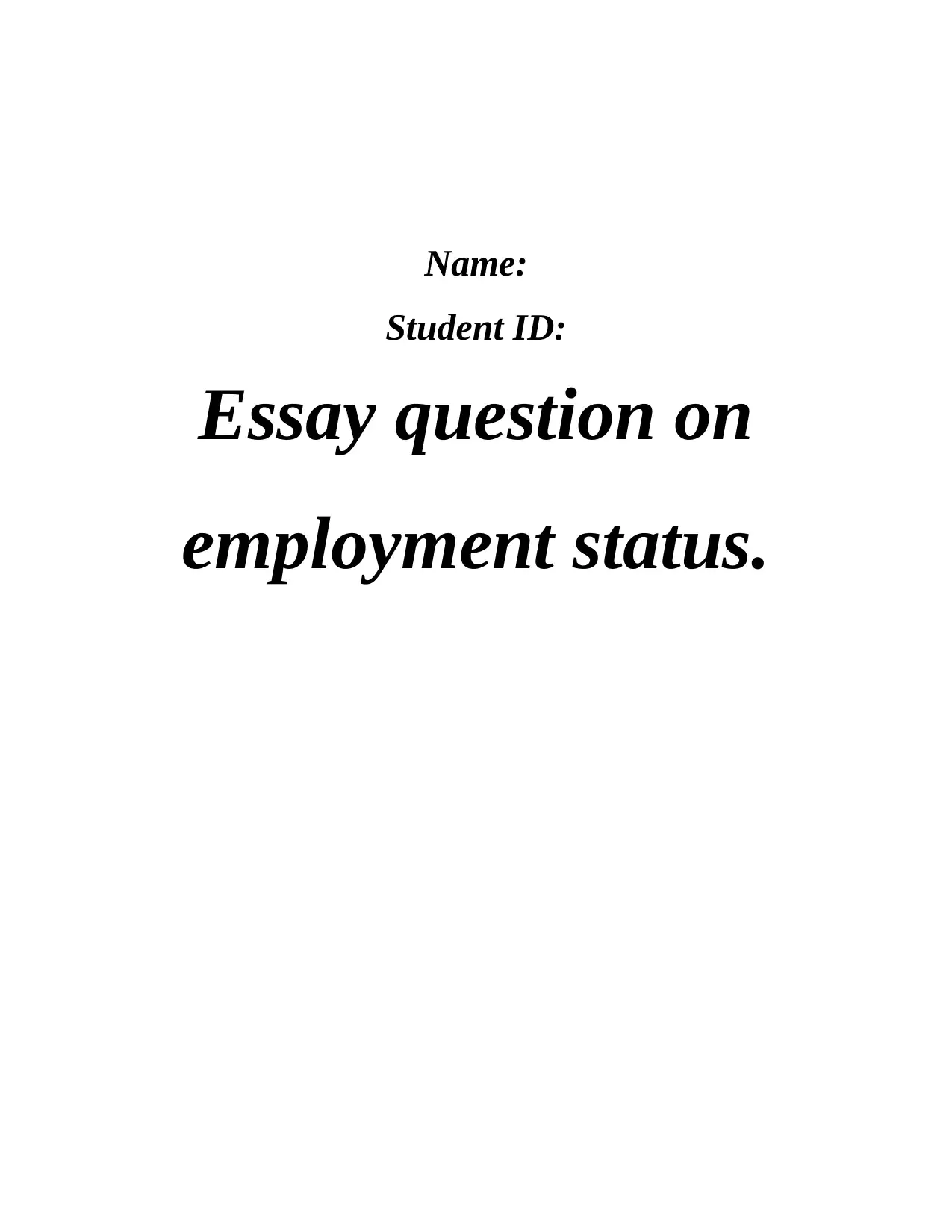
Name:
Student ID:
Essay question on
employment status.
Student ID:
Essay question on
employment status.
Paraphrase This Document
Need a fresh take? Get an instant paraphrase of this document with our AI Paraphraser
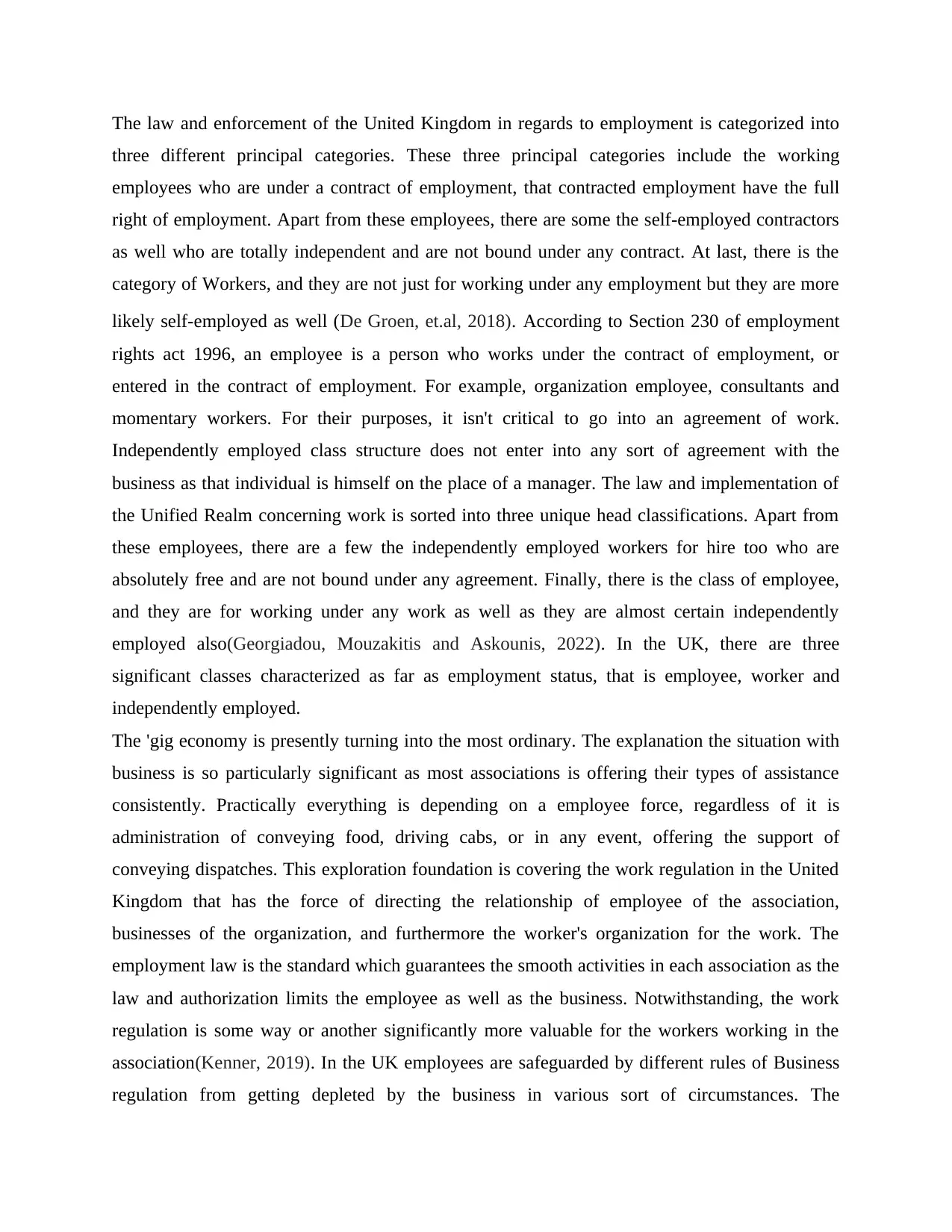
The law and enforcement of the United Kingdom in regards to employment is categorized into
three different principal categories. These three principal categories include the working
employees who are under a contract of employment, that contracted employment have the full
right of employment. Apart from these employees, there are some the self-employed contractors
as well who are totally independent and are not bound under any contract. At last, there is the
category of Workers, and they are not just for working under any employment but they are more
likely self-employed as well (De Groen, et.al, 2018). According to Section 230 of employment
rights act 1996, an employee is a person who works under the contract of employment, or
entered in the contract of employment. For example, organization employee, consultants and
momentary workers. For their purposes, it isn't critical to go into an agreement of work.
Independently employed class structure does not enter into any sort of agreement with the
business as that individual is himself on the place of a manager. The law and implementation of
the Unified Realm concerning work is sorted into three unique head classifications. Apart from
these employees, there are a few the independently employed workers for hire too who are
absolutely free and are not bound under any agreement. Finally, there is the class of employee,
and they are for working under any work as well as they are almost certain independently
employed also(Georgiadou, Mouzakitis and Askounis, 2022). In the UK, there are three
significant classes characterized as far as employment status, that is employee, worker and
independently employed.
The 'gig economy is presently turning into the most ordinary. The explanation the situation with
business is so particularly significant as most associations is offering their types of assistance
consistently. Practically everything is depending on a employee force, regardless of it is
administration of conveying food, driving cabs, or in any event, offering the support of
conveying dispatches. This exploration foundation is covering the work regulation in the United
Kingdom that has the force of directing the relationship of employee of the association,
businesses of the organization, and furthermore the worker's organization for the work. The
employment law is the standard which guarantees the smooth activities in each association as the
law and authorization limits the employee as well as the business. Notwithstanding, the work
regulation is some way or another significantly more valuable for the workers working in the
association(Kenner, 2019). In the UK employees are safeguarded by different rules of Business
regulation from getting depleted by the business in various sort of circumstances. The
three different principal categories. These three principal categories include the working
employees who are under a contract of employment, that contracted employment have the full
right of employment. Apart from these employees, there are some the self-employed contractors
as well who are totally independent and are not bound under any contract. At last, there is the
category of Workers, and they are not just for working under any employment but they are more
likely self-employed as well (De Groen, et.al, 2018). According to Section 230 of employment
rights act 1996, an employee is a person who works under the contract of employment, or
entered in the contract of employment. For example, organization employee, consultants and
momentary workers. For their purposes, it isn't critical to go into an agreement of work.
Independently employed class structure does not enter into any sort of agreement with the
business as that individual is himself on the place of a manager. The law and implementation of
the Unified Realm concerning work is sorted into three unique head classifications. Apart from
these employees, there are a few the independently employed workers for hire too who are
absolutely free and are not bound under any agreement. Finally, there is the class of employee,
and they are for working under any work as well as they are almost certain independently
employed also(Georgiadou, Mouzakitis and Askounis, 2022). In the UK, there are three
significant classes characterized as far as employment status, that is employee, worker and
independently employed.
The 'gig economy is presently turning into the most ordinary. The explanation the situation with
business is so particularly significant as most associations is offering their types of assistance
consistently. Practically everything is depending on a employee force, regardless of it is
administration of conveying food, driving cabs, or in any event, offering the support of
conveying dispatches. This exploration foundation is covering the work regulation in the United
Kingdom that has the force of directing the relationship of employee of the association,
businesses of the organization, and furthermore the worker's organization for the work. The
employment law is the standard which guarantees the smooth activities in each association as the
law and authorization limits the employee as well as the business. Notwithstanding, the work
regulation is some way or another significantly more valuable for the workers working in the
association(Kenner, 2019). In the UK employees are safeguarded by different rules of Business
regulation from getting depleted by the business in various sort of circumstances. The
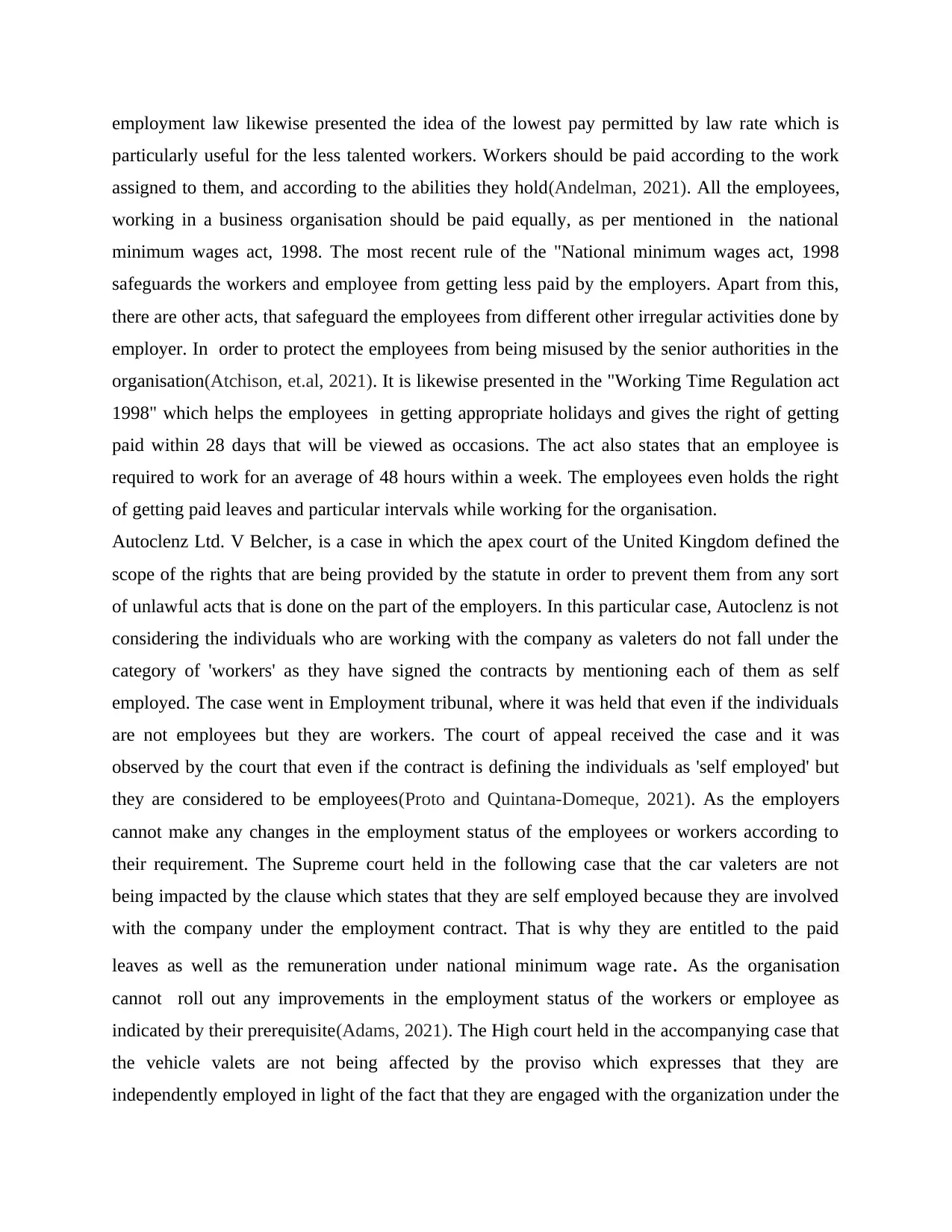
employment law likewise presented the idea of the lowest pay permitted by law rate which is
particularly useful for the less talented workers. Workers should be paid according to the work
assigned to them, and according to the abilities they hold(Andelman, 2021). All the employees,
working in a business organisation should be paid equally, as per mentioned in the national
minimum wages act, 1998. The most recent rule of the "National minimum wages act, 1998
safeguards the workers and employee from getting less paid by the employers. Apart from this,
there are other acts, that safeguard the employees from different other irregular activities done by
employer. In order to protect the employees from being misused by the senior authorities in the
organisation(Atchison, et.al, 2021). It is likewise presented in the "Working Time Regulation act
1998" which helps the employees in getting appropriate holidays and gives the right of getting
paid within 28 days that will be viewed as occasions. The act also states that an employee is
required to work for an average of 48 hours within a week. The employees even holds the right
of getting paid leaves and particular intervals while working for the organisation.
Autoclenz Ltd. V Belcher, is a case in which the apex court of the United Kingdom defined the
scope of the rights that are being provided by the statute in order to prevent them from any sort
of unlawful acts that is done on the part of the employers. In this particular case, Autoclenz is not
considering the individuals who are working with the company as valeters do not fall under the
category of 'workers' as they have signed the contracts by mentioning each of them as self
employed. The case went in Employment tribunal, where it was held that even if the individuals
are not employees but they are workers. The court of appeal received the case and it was
observed by the court that even if the contract is defining the individuals as 'self employed' but
they are considered to be employees(Proto and Quintana-Domeque, 2021). As the employers
cannot make any changes in the employment status of the employees or workers according to
their requirement. The Supreme court held in the following case that the car valeters are not
being impacted by the clause which states that they are self employed because they are involved
with the company under the employment contract. That is why they are entitled to the paid
leaves as well as the remuneration under national minimum wage rate. As the organisation
cannot roll out any improvements in the employment status of the workers or employee as
indicated by their prerequisite(Adams, 2021). The High court held in the accompanying case that
the vehicle valets are not being affected by the proviso which expresses that they are
independently employed in light of the fact that they are engaged with the organization under the
particularly useful for the less talented workers. Workers should be paid according to the work
assigned to them, and according to the abilities they hold(Andelman, 2021). All the employees,
working in a business organisation should be paid equally, as per mentioned in the national
minimum wages act, 1998. The most recent rule of the "National minimum wages act, 1998
safeguards the workers and employee from getting less paid by the employers. Apart from this,
there are other acts, that safeguard the employees from different other irregular activities done by
employer. In order to protect the employees from being misused by the senior authorities in the
organisation(Atchison, et.al, 2021). It is likewise presented in the "Working Time Regulation act
1998" which helps the employees in getting appropriate holidays and gives the right of getting
paid within 28 days that will be viewed as occasions. The act also states that an employee is
required to work for an average of 48 hours within a week. The employees even holds the right
of getting paid leaves and particular intervals while working for the organisation.
Autoclenz Ltd. V Belcher, is a case in which the apex court of the United Kingdom defined the
scope of the rights that are being provided by the statute in order to prevent them from any sort
of unlawful acts that is done on the part of the employers. In this particular case, Autoclenz is not
considering the individuals who are working with the company as valeters do not fall under the
category of 'workers' as they have signed the contracts by mentioning each of them as self
employed. The case went in Employment tribunal, where it was held that even if the individuals
are not employees but they are workers. The court of appeal received the case and it was
observed by the court that even if the contract is defining the individuals as 'self employed' but
they are considered to be employees(Proto and Quintana-Domeque, 2021). As the employers
cannot make any changes in the employment status of the employees or workers according to
their requirement. The Supreme court held in the following case that the car valeters are not
being impacted by the clause which states that they are self employed because they are involved
with the company under the employment contract. That is why they are entitled to the paid
leaves as well as the remuneration under national minimum wage rate. As the organisation
cannot roll out any improvements in the employment status of the workers or employee as
indicated by their prerequisite(Adams, 2021). The High court held in the accompanying case that
the vehicle valets are not being affected by the proviso which expresses that they are
independently employed in light of the fact that they are engaged with the organization under the
⊘ This is a preview!⊘
Do you want full access?
Subscribe today to unlock all pages.

Trusted by 1+ million students worldwide
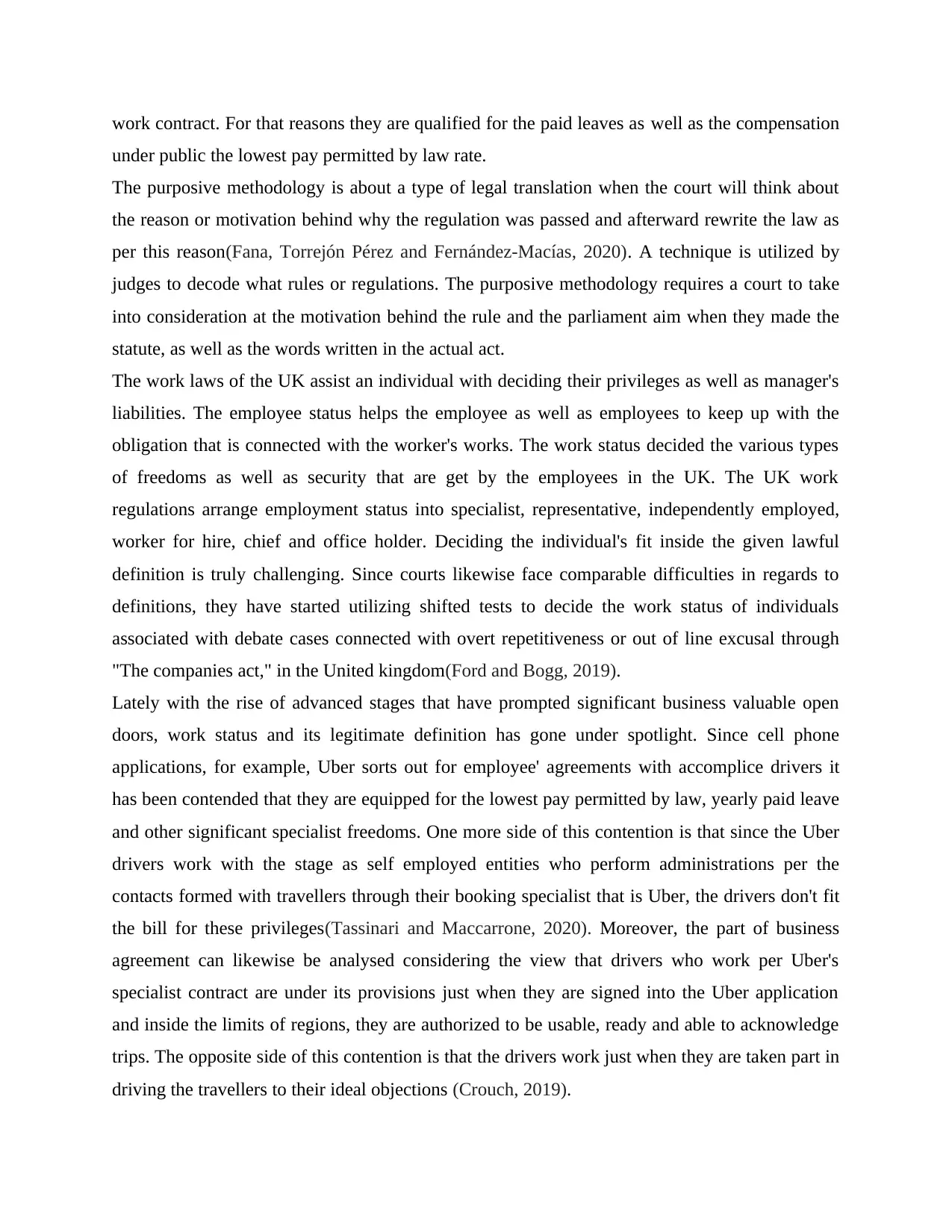
work contract. For that reasons they are qualified for the paid leaves as well as the compensation
under public the lowest pay permitted by law rate.
The purposive methodology is about a type of legal translation when the court will think about
the reason or motivation behind why the regulation was passed and afterward rewrite the law as
per this reason(Fana, Torrejón Pérez and Fernández-Macías, 2020). A technique is utilized by
judges to decode what rules or regulations. The purposive methodology requires a court to take
into consideration at the motivation behind the rule and the parliament aim when they made the
statute, as well as the words written in the actual act.
The work laws of the UK assist an individual with deciding their privileges as well as manager's
liabilities. The employee status helps the employee as well as employees to keep up with the
obligation that is connected with the worker's works. The work status decided the various types
of freedoms as well as security that are get by the employees in the UK. The UK work
regulations arrange employment status into specialist, representative, independently employed,
worker for hire, chief and office holder. Deciding the individual's fit inside the given lawful
definition is truly challenging. Since courts likewise face comparable difficulties in regards to
definitions, they have started utilizing shifted tests to decide the work status of individuals
associated with debate cases connected with overt repetitiveness or out of line excusal through
"The companies act," in the United kingdom(Ford and Bogg, 2019).
Lately with the rise of advanced stages that have prompted significant business valuable open
doors, work status and its legitimate definition has gone under spotlight. Since cell phone
applications, for example, Uber sorts out for employee' agreements with accomplice drivers it
has been contended that they are equipped for the lowest pay permitted by law, yearly paid leave
and other significant specialist freedoms. One more side of this contention is that since the Uber
drivers work with the stage as self employed entities who perform administrations per the
contacts formed with travellers through their booking specialist that is Uber, the drivers don't fit
the bill for these privileges(Tassinari and Maccarrone, 2020). Moreover, the part of business
agreement can likewise be analysed considering the view that drivers who work per Uber's
specialist contract are under its provisions just when they are signed into the Uber application
and inside the limits of regions, they are authorized to be usable, ready and able to acknowledge
trips. The opposite side of this contention is that the drivers work just when they are taken part in
driving the travellers to their ideal objections (Crouch, 2019).
under public the lowest pay permitted by law rate.
The purposive methodology is about a type of legal translation when the court will think about
the reason or motivation behind why the regulation was passed and afterward rewrite the law as
per this reason(Fana, Torrejón Pérez and Fernández-Macías, 2020). A technique is utilized by
judges to decode what rules or regulations. The purposive methodology requires a court to take
into consideration at the motivation behind the rule and the parliament aim when they made the
statute, as well as the words written in the actual act.
The work laws of the UK assist an individual with deciding their privileges as well as manager's
liabilities. The employee status helps the employee as well as employees to keep up with the
obligation that is connected with the worker's works. The work status decided the various types
of freedoms as well as security that are get by the employees in the UK. The UK work
regulations arrange employment status into specialist, representative, independently employed,
worker for hire, chief and office holder. Deciding the individual's fit inside the given lawful
definition is truly challenging. Since courts likewise face comparable difficulties in regards to
definitions, they have started utilizing shifted tests to decide the work status of individuals
associated with debate cases connected with overt repetitiveness or out of line excusal through
"The companies act," in the United kingdom(Ford and Bogg, 2019).
Lately with the rise of advanced stages that have prompted significant business valuable open
doors, work status and its legitimate definition has gone under spotlight. Since cell phone
applications, for example, Uber sorts out for employee' agreements with accomplice drivers it
has been contended that they are equipped for the lowest pay permitted by law, yearly paid leave
and other significant specialist freedoms. One more side of this contention is that since the Uber
drivers work with the stage as self employed entities who perform administrations per the
contacts formed with travellers through their booking specialist that is Uber, the drivers don't fit
the bill for these privileges(Tassinari and Maccarrone, 2020). Moreover, the part of business
agreement can likewise be analysed considering the view that drivers who work per Uber's
specialist contract are under its provisions just when they are signed into the Uber application
and inside the limits of regions, they are authorized to be usable, ready and able to acknowledge
trips. The opposite side of this contention is that the drivers work just when they are taken part in
driving the travellers to their ideal objections (Crouch, 2019).
Paraphrase This Document
Need a fresh take? Get an instant paraphrase of this document with our AI Paraphraser

The current work has massive ramifications in regards to specialist strengthening advancement
and employee assurance. The changing times and appearance of the 'gig economy' has made it
important to analyse aggregate and individual work relations and their guideline. Uber and
comparable other advanced stages are expected to be efficiently concentrated so their functional
effect on employee business paper not entirely set in stone and revised if necessary. Furthermore,
the discoveries can assist with distinguishing any regions that can be used to forestall employee
excusal by bosses without a trace of a worthwhile motivation(Haines, 2018).
It is trusted that work regulations adjusted considering the gig economy tasks will assist with
forestalling any further minimizing of work conditions by confining the opportunity of terms
contracting among reaching accomplices, and setting up least security and pay norms. The
guideline of work regulations affects the business market administration it restricts the base and
most extreme working hours and wages broadly, in unambiguous areas as well as ventures.
A group of individuals has filed a claim under employment tribunal in the year 2015, urging that
they are entitled to receive the paid leaves and minimum wages under employment rights act
1996 and national minimum wages act 1998(Aslam and Woodcock, 2020). They have given this
contention on the basis of their argument that they fall under the category of 'workers' rather then
self employed. On the other hand Uber has quashed down the claims of the drivers by saying that
they cannot be considered as workers because they are free to drive on their according to their
own will, that is more or less and there is no restriction on them regarding working for any other
organization. Along with that they pay their own taxes and expenditures. That is why they are
self employed rather than a worker. So, they are not eligible to receive any remedy as
compensation under the employment law of United Kingdom(Bales and Mayblin, 2018). The
employment tribunal given its judgement in the favour of the drivers. After receiving
dissatisfaction from the employment tribunal, Uber filed an appeal before the supreme court. The
major issues that were framed by the court is that:
Whether the drivers falls in the ambit of the category of 'workers' or not.
Whether they are entitled to receive paid leaves and guaranteed wages that is minimum
wage or not.
It was further argued by Uber that when the passenger book the ride, it is a contract made
between the driver and the passenger, Uber plays no role here. They were not being hired
and employee assurance. The changing times and appearance of the 'gig economy' has made it
important to analyse aggregate and individual work relations and their guideline. Uber and
comparable other advanced stages are expected to be efficiently concentrated so their functional
effect on employee business paper not entirely set in stone and revised if necessary. Furthermore,
the discoveries can assist with distinguishing any regions that can be used to forestall employee
excusal by bosses without a trace of a worthwhile motivation(Haines, 2018).
It is trusted that work regulations adjusted considering the gig economy tasks will assist with
forestalling any further minimizing of work conditions by confining the opportunity of terms
contracting among reaching accomplices, and setting up least security and pay norms. The
guideline of work regulations affects the business market administration it restricts the base and
most extreme working hours and wages broadly, in unambiguous areas as well as ventures.
A group of individuals has filed a claim under employment tribunal in the year 2015, urging that
they are entitled to receive the paid leaves and minimum wages under employment rights act
1996 and national minimum wages act 1998(Aslam and Woodcock, 2020). They have given this
contention on the basis of their argument that they fall under the category of 'workers' rather then
self employed. On the other hand Uber has quashed down the claims of the drivers by saying that
they cannot be considered as workers because they are free to drive on their according to their
own will, that is more or less and there is no restriction on them regarding working for any other
organization. Along with that they pay their own taxes and expenditures. That is why they are
self employed rather than a worker. So, they are not eligible to receive any remedy as
compensation under the employment law of United Kingdom(Bales and Mayblin, 2018). The
employment tribunal given its judgement in the favour of the drivers. After receiving
dissatisfaction from the employment tribunal, Uber filed an appeal before the supreme court. The
major issues that were framed by the court is that:
Whether the drivers falls in the ambit of the category of 'workers' or not.
Whether they are entitled to receive paid leaves and guaranteed wages that is minimum
wage or not.
It was further argued by Uber that when the passenger book the ride, it is a contract made
between the driver and the passenger, Uber plays no role here. They were not being hired
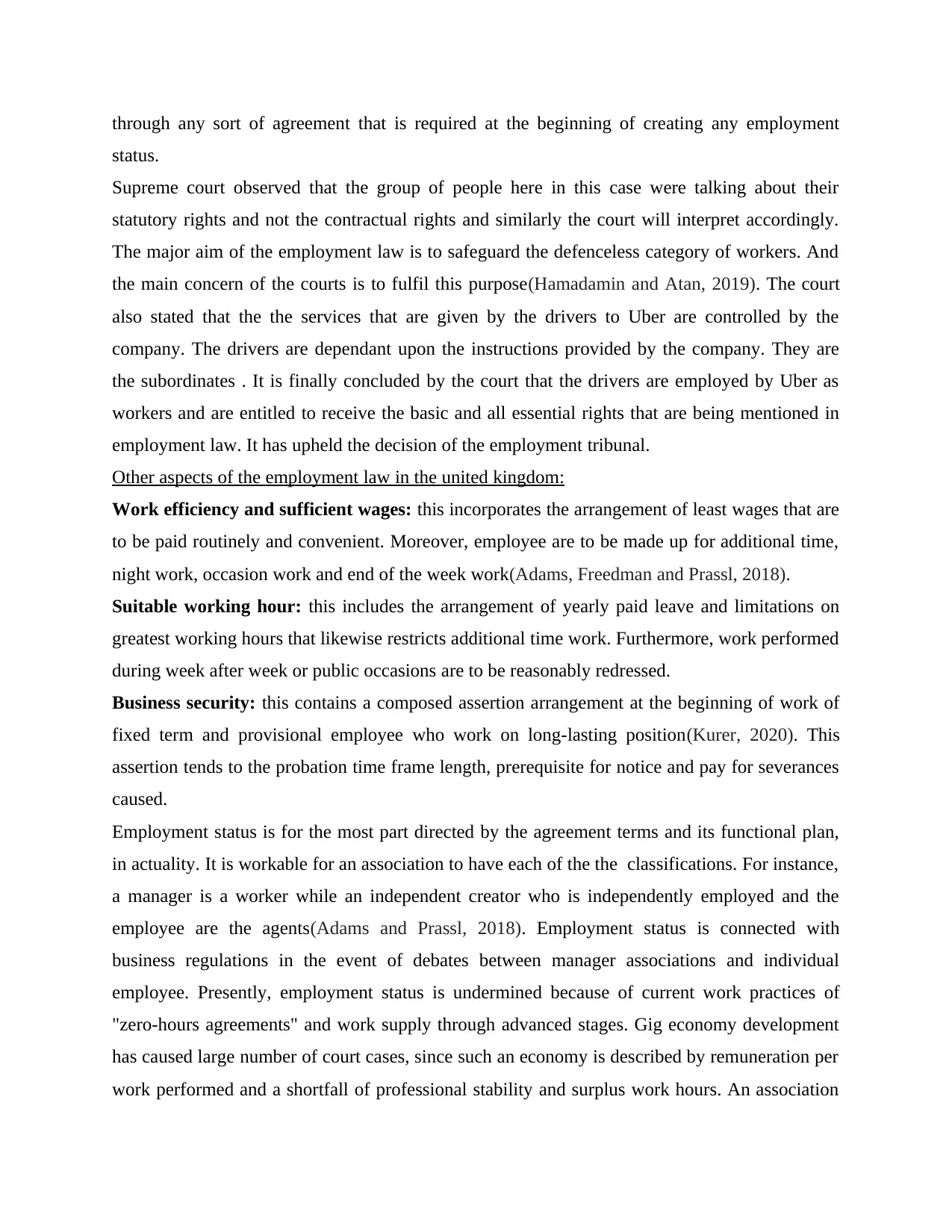
through any sort of agreement that is required at the beginning of creating any employment
status.
Supreme court observed that the group of people here in this case were talking about their
statutory rights and not the contractual rights and similarly the court will interpret accordingly.
The major aim of the employment law is to safeguard the defenceless category of workers. And
the main concern of the courts is to fulfil this purpose(Hamadamin and Atan, 2019). The court
also stated that the the services that are given by the drivers to Uber are controlled by the
company. The drivers are dependant upon the instructions provided by the company. They are
the subordinates . It is finally concluded by the court that the drivers are employed by Uber as
workers and are entitled to receive the basic and all essential rights that are being mentioned in
employment law. It has upheld the decision of the employment tribunal.
Other aspects of the employment law in the united kingdom:
Work efficiency and sufficient wages: this incorporates the arrangement of least wages that are
to be paid routinely and convenient. Moreover, employee are to be made up for additional time,
night work, occasion work and end of the week work(Adams, Freedman and Prassl, 2018).
Suitable working hour: this includes the arrangement of yearly paid leave and limitations on
greatest working hours that likewise restricts additional time work. Furthermore, work performed
during week after week or public occasions are to be reasonably redressed.
Business security: this contains a composed assertion arrangement at the beginning of work of
fixed term and provisional employee who work on long-lasting position(Kurer, 2020). This
assertion tends to the probation time frame length, prerequisite for notice and pay for severances
caused.
Employment status is for the most part directed by the agreement terms and its functional plan,
in actuality. It is workable for an association to have each of the the classifications. For instance,
a manager is a worker while an independent creator who is independently employed and the
employee are the agents(Adams and Prassl, 2018). Employment status is connected with
business regulations in the event of debates between manager associations and individual
employee. Presently, employment status is undermined because of current work practices of
"zero-hours agreements" and work supply through advanced stages. Gig economy development
has caused large number of court cases, since such an economy is described by remuneration per
work performed and a shortfall of professional stability and surplus work hours. An association
status.
Supreme court observed that the group of people here in this case were talking about their
statutory rights and not the contractual rights and similarly the court will interpret accordingly.
The major aim of the employment law is to safeguard the defenceless category of workers. And
the main concern of the courts is to fulfil this purpose(Hamadamin and Atan, 2019). The court
also stated that the the services that are given by the drivers to Uber are controlled by the
company. The drivers are dependant upon the instructions provided by the company. They are
the subordinates . It is finally concluded by the court that the drivers are employed by Uber as
workers and are entitled to receive the basic and all essential rights that are being mentioned in
employment law. It has upheld the decision of the employment tribunal.
Other aspects of the employment law in the united kingdom:
Work efficiency and sufficient wages: this incorporates the arrangement of least wages that are
to be paid routinely and convenient. Moreover, employee are to be made up for additional time,
night work, occasion work and end of the week work(Adams, Freedman and Prassl, 2018).
Suitable working hour: this includes the arrangement of yearly paid leave and limitations on
greatest working hours that likewise restricts additional time work. Furthermore, work performed
during week after week or public occasions are to be reasonably redressed.
Business security: this contains a composed assertion arrangement at the beginning of work of
fixed term and provisional employee who work on long-lasting position(Kurer, 2020). This
assertion tends to the probation time frame length, prerequisite for notice and pay for severances
caused.
Employment status is for the most part directed by the agreement terms and its functional plan,
in actuality. It is workable for an association to have each of the the classifications. For instance,
a manager is a worker while an independent creator who is independently employed and the
employee are the agents(Adams and Prassl, 2018). Employment status is connected with
business regulations in the event of debates between manager associations and individual
employee. Presently, employment status is undermined because of current work practices of
"zero-hours agreements" and work supply through advanced stages. Gig economy development
has caused large number of court cases, since such an economy is described by remuneration per
work performed and a shortfall of professional stability and surplus work hours. An association
⊘ This is a preview!⊘
Do you want full access?
Subscribe today to unlock all pages.

Trusted by 1+ million students worldwide

then again expect to comprehend a representative's work status since it has massive duty
suggestions. For this situation, "Uber B.V. Versus Aslam" can be connected with assistance for
this present circumstance. This case is like this present circumstance and can be useful to know
the law(Alberti, et.al, 2018).
Independently employed project workers are qualified for just the privileges of security and
safety assurance, segregation insurance in unambiguous cases and abuse insurance in the wake of
whistleblowing. Tax collection contrasts as indicated by employment status also. The
independently employed are expected to make their public protection and duty instalments.
Business associations then again are expected to deduct "national insurance (NI)" and annual
duties from the profit of the two workers and employees. In any case, conceivable despite the
fact that an individual might be burdened like a representative they may not meet all
requirements for full work freedoms because of expense purposes legitimate tests. Self-employed
entities take care of their assignments themselves as opposed to appointing them to other people.
Independently employed individuals are decided on their capacity to stay in business by their
own record(Chamdani, et.al, 2022). This infers that they are to give their gear, employ assistants,
face monetary challenges, be answerable for the board and ventures, and benefit off sound
administration.
Employment status qualifies employee for principal work privileges. Guideline of recruiting and
terminating rehearses safeguards the workers and improves their work security, dependability,
pay and misuse avoidance. Such guidelines prompted better turnover for the organizations and
diminished terminating as well as new worker preparing costs(Thompson, 2018).
Through the "Employment Rights Act 1996" the employees are safeguarded against the
uncommon end and hold the instalment which is material for the whole length of their work
administration. A business ought to decide the clarification that achieved the worker dismissal.
In the UK an individual might be an employee, or an independently employed worker for hire.
Employees take in the most far reaching privileges accessible under the law, while workers are
restricted to a subset of those freedoms. For example, workers reserve the option to wiped out
pay (in specific conditions), to be consequently enlisted into a benefits plot, to the Public the
national minimum wage permitted by law and to occasion, rest breaks and different securities
managed the cost of by the working time regulation(WTR). Really independently employed
suggestions. For this situation, "Uber B.V. Versus Aslam" can be connected with assistance for
this present circumstance. This case is like this present circumstance and can be useful to know
the law(Alberti, et.al, 2018).
Independently employed project workers are qualified for just the privileges of security and
safety assurance, segregation insurance in unambiguous cases and abuse insurance in the wake of
whistleblowing. Tax collection contrasts as indicated by employment status also. The
independently employed are expected to make their public protection and duty instalments.
Business associations then again are expected to deduct "national insurance (NI)" and annual
duties from the profit of the two workers and employees. In any case, conceivable despite the
fact that an individual might be burdened like a representative they may not meet all
requirements for full work freedoms because of expense purposes legitimate tests. Self-employed
entities take care of their assignments themselves as opposed to appointing them to other people.
Independently employed individuals are decided on their capacity to stay in business by their
own record(Chamdani, et.al, 2022). This infers that they are to give their gear, employ assistants,
face monetary challenges, be answerable for the board and ventures, and benefit off sound
administration.
Employment status qualifies employee for principal work privileges. Guideline of recruiting and
terminating rehearses safeguards the workers and improves their work security, dependability,
pay and misuse avoidance. Such guidelines prompted better turnover for the organizations and
diminished terminating as well as new worker preparing costs(Thompson, 2018).
Through the "Employment Rights Act 1996" the employees are safeguarded against the
uncommon end and hold the instalment which is material for the whole length of their work
administration. A business ought to decide the clarification that achieved the worker dismissal.
In the UK an individual might be an employee, or an independently employed worker for hire.
Employees take in the most far reaching privileges accessible under the law, while workers are
restricted to a subset of those freedoms. For example, workers reserve the option to wiped out
pay (in specific conditions), to be consequently enlisted into a benefits plot, to the Public the
national minimum wage permitted by law and to occasion, rest breaks and different securities
managed the cost of by the working time regulation(WTR). Really independently employed
Paraphrase This Document
Need a fresh take? Get an instant paraphrase of this document with our AI Paraphraser
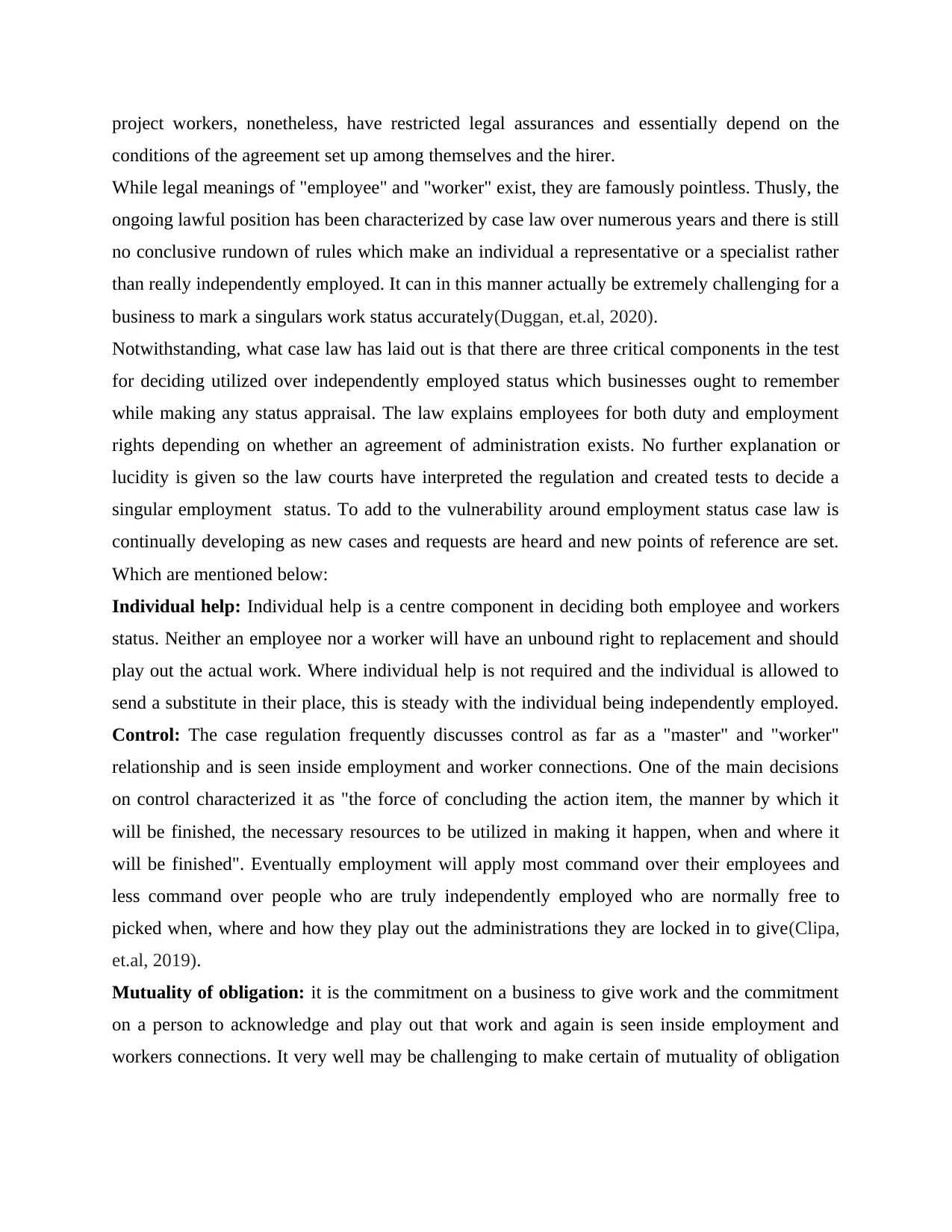
project workers, nonetheless, have restricted legal assurances and essentially depend on the
conditions of the agreement set up among themselves and the hirer.
While legal meanings of "employee" and "worker" exist, they are famously pointless. Thusly, the
ongoing lawful position has been characterized by case law over numerous years and there is still
no conclusive rundown of rules which make an individual a representative or a specialist rather
than really independently employed. It can in this manner actually be extremely challenging for a
business to mark a singulars work status accurately(Duggan, et.al, 2020).
Notwithstanding, what case law has laid out is that there are three critical components in the test
for deciding utilized over independently employed status which businesses ought to remember
while making any status appraisal. The law explains employees for both duty and employment
rights depending on whether an agreement of administration exists. No further explanation or
lucidity is given so the law courts have interpreted the regulation and created tests to decide a
singular employment status. To add to the vulnerability around employment status case law is
continually developing as new cases and requests are heard and new points of reference are set.
Which are mentioned below:
Individual help: Individual help is a centre component in deciding both employee and workers
status. Neither an employee nor a worker will have an unbound right to replacement and should
play out the actual work. Where individual help is not required and the individual is allowed to
send a substitute in their place, this is steady with the individual being independently employed.
Control: The case regulation frequently discusses control as far as a "master" and "worker"
relationship and is seen inside employment and worker connections. One of the main decisions
on control characterized it as "the force of concluding the action item, the manner by which it
will be finished, the necessary resources to be utilized in making it happen, when and where it
will be finished". Eventually employment will apply most command over their employees and
less command over people who are truly independently employed who are normally free to
picked when, where and how they play out the administrations they are locked in to give(Clipa,
et.al, 2019).
Mutuality of obligation: it is the commitment on a business to give work and the commitment
on a person to acknowledge and play out that work and again is seen inside employment and
workers connections. It very well may be challenging to make certain of mutuality of obligation
conditions of the agreement set up among themselves and the hirer.
While legal meanings of "employee" and "worker" exist, they are famously pointless. Thusly, the
ongoing lawful position has been characterized by case law over numerous years and there is still
no conclusive rundown of rules which make an individual a representative or a specialist rather
than really independently employed. It can in this manner actually be extremely challenging for a
business to mark a singulars work status accurately(Duggan, et.al, 2020).
Notwithstanding, what case law has laid out is that there are three critical components in the test
for deciding utilized over independently employed status which businesses ought to remember
while making any status appraisal. The law explains employees for both duty and employment
rights depending on whether an agreement of administration exists. No further explanation or
lucidity is given so the law courts have interpreted the regulation and created tests to decide a
singular employment status. To add to the vulnerability around employment status case law is
continually developing as new cases and requests are heard and new points of reference are set.
Which are mentioned below:
Individual help: Individual help is a centre component in deciding both employee and workers
status. Neither an employee nor a worker will have an unbound right to replacement and should
play out the actual work. Where individual help is not required and the individual is allowed to
send a substitute in their place, this is steady with the individual being independently employed.
Control: The case regulation frequently discusses control as far as a "master" and "worker"
relationship and is seen inside employment and worker connections. One of the main decisions
on control characterized it as "the force of concluding the action item, the manner by which it
will be finished, the necessary resources to be utilized in making it happen, when and where it
will be finished". Eventually employment will apply most command over their employees and
less command over people who are truly independently employed who are normally free to
picked when, where and how they play out the administrations they are locked in to give(Clipa,
et.al, 2019).
Mutuality of obligation: it is the commitment on a business to give work and the commitment
on a person to acknowledge and play out that work and again is seen inside employment and
workers connections. It very well may be challenging to make certain of mutuality of obligation
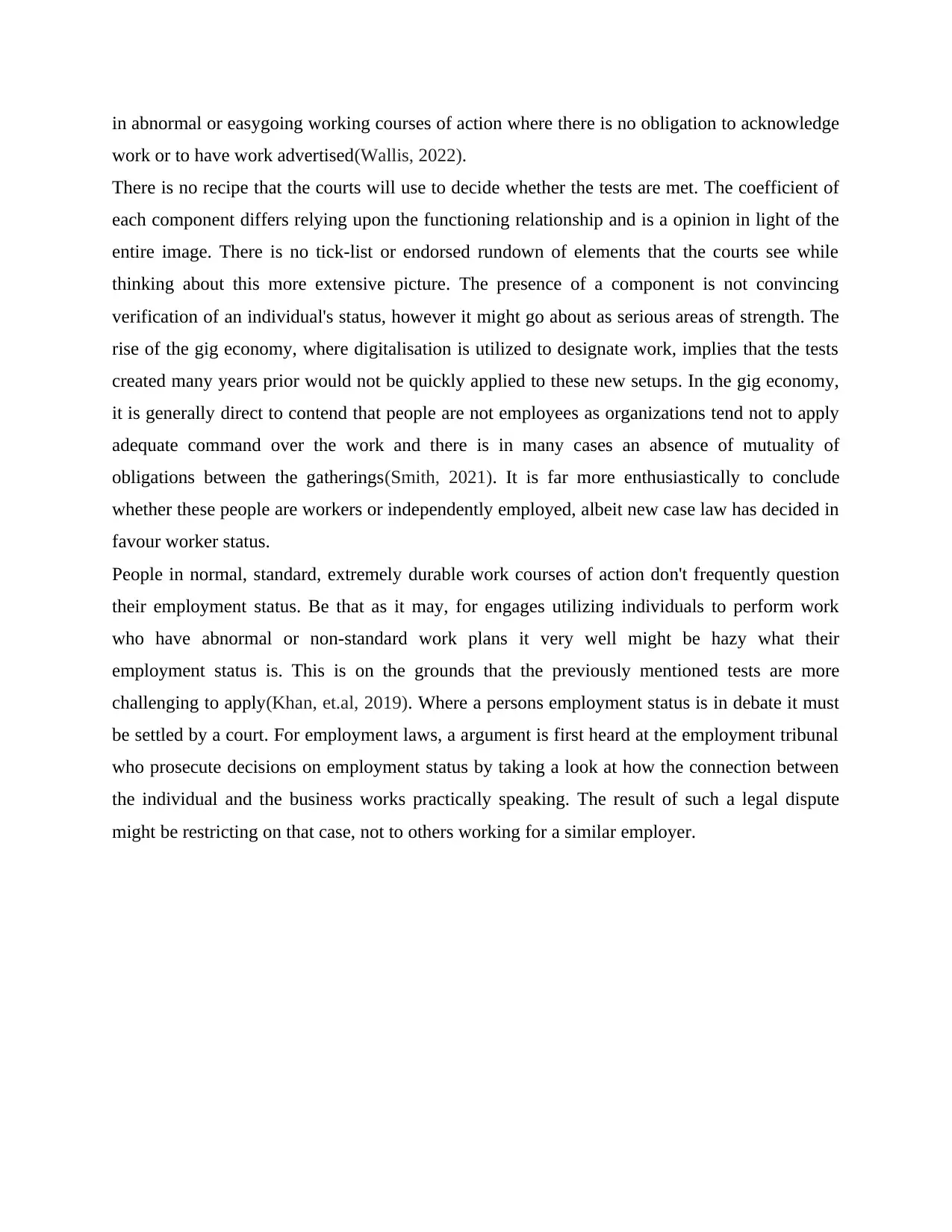
in abnormal or easygoing working courses of action where there is no obligation to acknowledge
work or to have work advertised(Wallis, 2022).
There is no recipe that the courts will use to decide whether the tests are met. The coefficient of
each component differs relying upon the functioning relationship and is a opinion in light of the
entire image. There is no tick-list or endorsed rundown of elements that the courts see while
thinking about this more extensive picture. The presence of a component is not convincing
verification of an individual's status, however it might go about as serious areas of strength. The
rise of the gig economy, where digitalisation is utilized to designate work, implies that the tests
created many years prior would not be quickly applied to these new setups. In the gig economy,
it is generally direct to contend that people are not employees as organizations tend not to apply
adequate command over the work and there is in many cases an absence of mutuality of
obligations between the gatherings(Smith, 2021). It is far more enthusiastically to conclude
whether these people are workers or independently employed, albeit new case law has decided in
favour worker status.
People in normal, standard, extremely durable work courses of action don't frequently question
their employment status. Be that as it may, for engages utilizing individuals to perform work
who have abnormal or non-standard work plans it very well might be hazy what their
employment status is. This is on the grounds that the previously mentioned tests are more
challenging to apply(Khan, et.al, 2019). Where a persons employment status is in debate it must
be settled by a court. For employment laws, a argument is first heard at the employment tribunal
who prosecute decisions on employment status by taking a look at how the connection between
the individual and the business works practically speaking. The result of such a legal dispute
might be restricting on that case, not to others working for a similar employer.
work or to have work advertised(Wallis, 2022).
There is no recipe that the courts will use to decide whether the tests are met. The coefficient of
each component differs relying upon the functioning relationship and is a opinion in light of the
entire image. There is no tick-list or endorsed rundown of elements that the courts see while
thinking about this more extensive picture. The presence of a component is not convincing
verification of an individual's status, however it might go about as serious areas of strength. The
rise of the gig economy, where digitalisation is utilized to designate work, implies that the tests
created many years prior would not be quickly applied to these new setups. In the gig economy,
it is generally direct to contend that people are not employees as organizations tend not to apply
adequate command over the work and there is in many cases an absence of mutuality of
obligations between the gatherings(Smith, 2021). It is far more enthusiastically to conclude
whether these people are workers or independently employed, albeit new case law has decided in
favour worker status.
People in normal, standard, extremely durable work courses of action don't frequently question
their employment status. Be that as it may, for engages utilizing individuals to perform work
who have abnormal or non-standard work plans it very well might be hazy what their
employment status is. This is on the grounds that the previously mentioned tests are more
challenging to apply(Khan, et.al, 2019). Where a persons employment status is in debate it must
be settled by a court. For employment laws, a argument is first heard at the employment tribunal
who prosecute decisions on employment status by taking a look at how the connection between
the individual and the business works practically speaking. The result of such a legal dispute
might be restricting on that case, not to others working for a similar employer.
⊘ This is a preview!⊘
Do you want full access?
Subscribe today to unlock all pages.

Trusted by 1+ million students worldwide
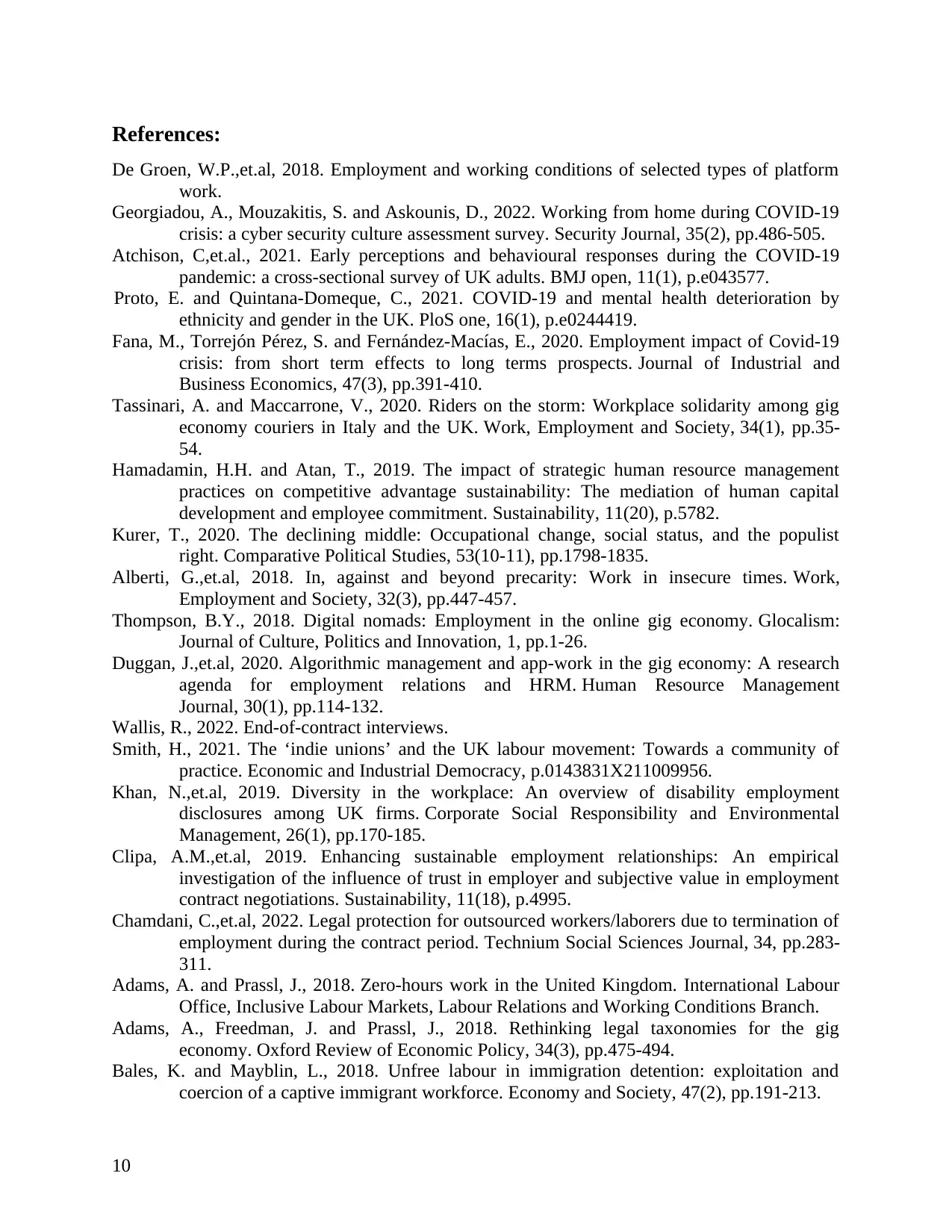
References:
De Groen, W.P.,et.al, 2018. Employment and working conditions of selected types of platform
work.
Georgiadou, A., Mouzakitis, S. and Askounis, D., 2022. Working from home during COVID-19
crisis: a cyber security culture assessment survey. Security Journal, 35(2), pp.486-505.
Atchison, C,et.al., 2021. Early perceptions and behavioural responses during the COVID-19
pandemic: a cross-sectional survey of UK adults. BMJ open, 11(1), p.e043577.
Proto, E. and Quintana-Domeque, C., 2021. COVID-19 and mental health deterioration by
ethnicity and gender in the UK. PloS one, 16(1), p.e0244419.
Fana, M., Torrejón Pérez, S. and Fernández-Macías, E., 2020. Employment impact of Covid-19
crisis: from short term effects to long terms prospects. Journal of Industrial and
Business Economics, 47(3), pp.391-410.
Tassinari, A. and Maccarrone, V., 2020. Riders on the storm: Workplace solidarity among gig
economy couriers in Italy and the UK. Work, Employment and Society, 34(1), pp.35-
54.
Hamadamin, H.H. and Atan, T., 2019. The impact of strategic human resource management
practices on competitive advantage sustainability: The mediation of human capital
development and employee commitment. Sustainability, 11(20), p.5782.
Kurer, T., 2020. The declining middle: Occupational change, social status, and the populist
right. Comparative Political Studies, 53(10-11), pp.1798-1835.
Alberti, G.,et.al, 2018. In, against and beyond precarity: Work in insecure times. Work,
Employment and Society, 32(3), pp.447-457.
Thompson, B.Y., 2018. Digital nomads: Employment in the online gig economy. Glocalism:
Journal of Culture, Politics and Innovation, 1, pp.1-26.
Duggan, J.,et.al, 2020. Algorithmic management and app‐work in the gig economy: A research
agenda for employment relations and HRM. Human Resource Management
Journal, 30(1), pp.114-132.
Wallis, R., 2022. End-of-contract interviews.
Smith, H., 2021. The ‘indie unions’ and the UK labour movement: Towards a community of
practice. Economic and Industrial Democracy, p.0143831X211009956.
Khan, N.,et.al, 2019. Diversity in the workplace: An overview of disability employment
disclosures among UK firms. Corporate Social Responsibility and Environmental
Management, 26(1), pp.170-185.
Clipa, A.M.,et.al, 2019. Enhancing sustainable employment relationships: An empirical
investigation of the influence of trust in employer and subjective value in employment
contract negotiations. Sustainability, 11(18), p.4995.
Chamdani, C.,et.al, 2022. Legal protection for outsourced workers/laborers due to termination of
employment during the contract period. Technium Social Sciences Journal, 34, pp.283-
311.
Adams, A. and Prassl, J., 2018. Zero-hours work in the United Kingdom. International Labour
Office, Inclusive Labour Markets, Labour Relations and Working Conditions Branch.
Adams, A., Freedman, J. and Prassl, J., 2018. Rethinking legal taxonomies for the gig
economy. Oxford Review of Economic Policy, 34(3), pp.475-494.
Bales, K. and Mayblin, L., 2018. Unfree labour in immigration detention: exploitation and
coercion of a captive immigrant workforce. Economy and Society, 47(2), pp.191-213.
10
De Groen, W.P.,et.al, 2018. Employment and working conditions of selected types of platform
work.
Georgiadou, A., Mouzakitis, S. and Askounis, D., 2022. Working from home during COVID-19
crisis: a cyber security culture assessment survey. Security Journal, 35(2), pp.486-505.
Atchison, C,et.al., 2021. Early perceptions and behavioural responses during the COVID-19
pandemic: a cross-sectional survey of UK adults. BMJ open, 11(1), p.e043577.
Proto, E. and Quintana-Domeque, C., 2021. COVID-19 and mental health deterioration by
ethnicity and gender in the UK. PloS one, 16(1), p.e0244419.
Fana, M., Torrejón Pérez, S. and Fernández-Macías, E., 2020. Employment impact of Covid-19
crisis: from short term effects to long terms prospects. Journal of Industrial and
Business Economics, 47(3), pp.391-410.
Tassinari, A. and Maccarrone, V., 2020. Riders on the storm: Workplace solidarity among gig
economy couriers in Italy and the UK. Work, Employment and Society, 34(1), pp.35-
54.
Hamadamin, H.H. and Atan, T., 2019. The impact of strategic human resource management
practices on competitive advantage sustainability: The mediation of human capital
development and employee commitment. Sustainability, 11(20), p.5782.
Kurer, T., 2020. The declining middle: Occupational change, social status, and the populist
right. Comparative Political Studies, 53(10-11), pp.1798-1835.
Alberti, G.,et.al, 2018. In, against and beyond precarity: Work in insecure times. Work,
Employment and Society, 32(3), pp.447-457.
Thompson, B.Y., 2018. Digital nomads: Employment in the online gig economy. Glocalism:
Journal of Culture, Politics and Innovation, 1, pp.1-26.
Duggan, J.,et.al, 2020. Algorithmic management and app‐work in the gig economy: A research
agenda for employment relations and HRM. Human Resource Management
Journal, 30(1), pp.114-132.
Wallis, R., 2022. End-of-contract interviews.
Smith, H., 2021. The ‘indie unions’ and the UK labour movement: Towards a community of
practice. Economic and Industrial Democracy, p.0143831X211009956.
Khan, N.,et.al, 2019. Diversity in the workplace: An overview of disability employment
disclosures among UK firms. Corporate Social Responsibility and Environmental
Management, 26(1), pp.170-185.
Clipa, A.M.,et.al, 2019. Enhancing sustainable employment relationships: An empirical
investigation of the influence of trust in employer and subjective value in employment
contract negotiations. Sustainability, 11(18), p.4995.
Chamdani, C.,et.al, 2022. Legal protection for outsourced workers/laborers due to termination of
employment during the contract period. Technium Social Sciences Journal, 34, pp.283-
311.
Adams, A. and Prassl, J., 2018. Zero-hours work in the United Kingdom. International Labour
Office, Inclusive Labour Markets, Labour Relations and Working Conditions Branch.
Adams, A., Freedman, J. and Prassl, J., 2018. Rethinking legal taxonomies for the gig
economy. Oxford Review of Economic Policy, 34(3), pp.475-494.
Bales, K. and Mayblin, L., 2018. Unfree labour in immigration detention: exploitation and
coercion of a captive immigrant workforce. Economy and Society, 47(2), pp.191-213.
10
Paraphrase This Document
Need a fresh take? Get an instant paraphrase of this document with our AI Paraphraser
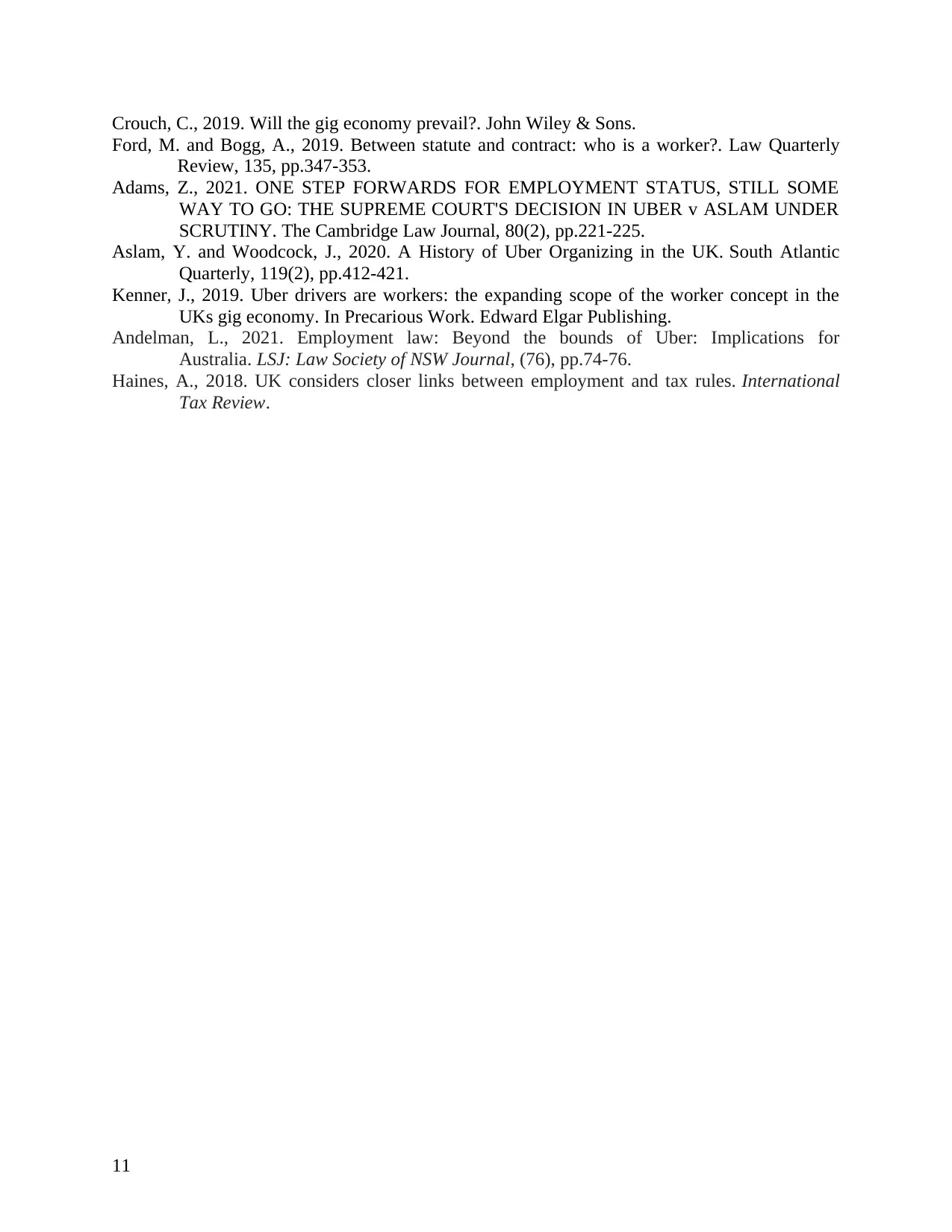
Crouch, C., 2019. Will the gig economy prevail?. John Wiley & Sons.
Ford, M. and Bogg, A., 2019. Between statute and contract: who is a worker?. Law Quarterly
Review, 135, pp.347-353.
Adams, Z., 2021. ONE STEP FORWARDS FOR EMPLOYMENT STATUS, STILL SOME
WAY TO GO: THE SUPREME COURT'S DECISION IN UBER v ASLAM UNDER
SCRUTINY. The Cambridge Law Journal, 80(2), pp.221-225.
Aslam, Y. and Woodcock, J., 2020. A History of Uber Organizing in the UK. South Atlantic
Quarterly, 119(2), pp.412-421.
Kenner, J., 2019. Uber drivers are workers: the expanding scope of the worker concept in the
UKs gig economy. In Precarious Work. Edward Elgar Publishing.
Andelman, L., 2021. Employment law: Beyond the bounds of Uber: Implications for
Australia. LSJ: Law Society of NSW Journal, (76), pp.74-76.
Haines, A., 2018. UK considers closer links between employment and tax rules. International
Tax Review.
11
Ford, M. and Bogg, A., 2019. Between statute and contract: who is a worker?. Law Quarterly
Review, 135, pp.347-353.
Adams, Z., 2021. ONE STEP FORWARDS FOR EMPLOYMENT STATUS, STILL SOME
WAY TO GO: THE SUPREME COURT'S DECISION IN UBER v ASLAM UNDER
SCRUTINY. The Cambridge Law Journal, 80(2), pp.221-225.
Aslam, Y. and Woodcock, J., 2020. A History of Uber Organizing in the UK. South Atlantic
Quarterly, 119(2), pp.412-421.
Kenner, J., 2019. Uber drivers are workers: the expanding scope of the worker concept in the
UKs gig economy. In Precarious Work. Edward Elgar Publishing.
Andelman, L., 2021. Employment law: Beyond the bounds of Uber: Implications for
Australia. LSJ: Law Society of NSW Journal, (76), pp.74-76.
Haines, A., 2018. UK considers closer links between employment and tax rules. International
Tax Review.
11
1 out of 11
Related Documents
Your All-in-One AI-Powered Toolkit for Academic Success.
+13062052269
info@desklib.com
Available 24*7 on WhatsApp / Email
![[object Object]](/_next/static/media/star-bottom.7253800d.svg)
Unlock your academic potential
Copyright © 2020–2026 A2Z Services. All Rights Reserved. Developed and managed by ZUCOL.





